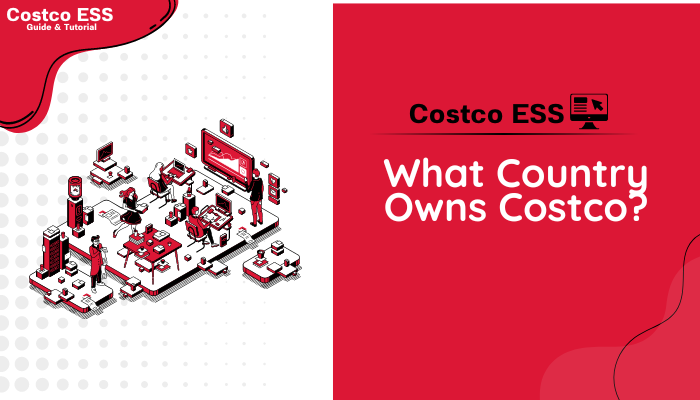Costco is a warehouse club that has grown into a retail giant due to its bulk deals and dedicated customer base but What Country Owns Costco? However, who owns this membership-based discount store? The present, past, and future of Costco can be understood by looking at its ownership structure.

What Country Owns Costco? Let’s Decode
The shopping experience at Costco is a one-of-a-kind but What Country Owns Costco?. It differs from traditional stores in that it operates on a membership basis.
Members pay an annual fee which allows them access to an extensive range of products at significantly lower prices than those found elsewhere. Such a bulk-buying strategy appeals to bargain hunters as well as families and businesses alike.
In addition to its low-priced offerings, another thing that sets Costco apart is its reputation for high-quality items along with generous return policies and excellent customer service.
This combination of value plus experience is what has driven their success over the years.
Importance behind Ownership
Knowing who owns Costco goes beyond finding out some interesting trivia about the company; it provides information about how decisions are made within the firm including whether they are focused towards long-term value or not and also shows if there are any stability issues looming large across the company’s structure too – here is why
- Alignment of Interests: When most institutional investors own majority shares in a company with long-term investment horizons; usually such investments will concentrate more on sustainable growth rates instead of short-term profits required by specific individual shareholders.
- Financial Strength: If many different kinds of organizations hold significant portions of stock in one enterprise then this indicates good healthiness financially speaking as well attractiveness to wider markets could be achieved through such diversified ownership bases being established within companies themselves.
- Governance: Understanding control over voting rights might reveal key decision-making processes at various levels throughout an organization depending on who controls them – so knowing ‘who’ decides ‘what’ becomes essential too whilst studying up on these things.
A Glimpse at Costco’s Past
In 1976, Sol Price opened the very first Price Club store in San Diego, California. Meanwhile, across town, Jim Sinegal founded the inaugural Costco Wholesale warehouse.
- The Merger: In 1993 Price Club merged with Costco Wholesale thus creating what is currently recognized as one of the largest retailers worldwide by revenue – this move not only broadened their geographical scope but also consolidated strengths which positioned them strongly within the membership-based discount industry.
- Expansion and Growth: After merging together with its former rival company; Costco went through an extended phase where it grew rapidly opening new stores all over America and even internationally thereby cementing its presence within major markets around the globe too.
- Key Moments: There have been several notable milestones throughout history such as surpassing Sam’s Club numbers back in 2003 or reaching eight hundred stores globally by twenty twenty-one; however these achievements merely serve to underline the continuous upward development trend displayed by Costco alongside its capacity for survival in competitive retailing environments.
Interpreting Ownership Labyrinth of Costco
Original Ownerships: The initial owners were Sinegal, Brotman and Price families who founded both companies respectively represented here today under consideration i.e., The Price Club along with Costco Wholesale Corporation itself initially known as Price Enterprises Inc etcetera.
So now let us dive into who exactly owns this warehousing giant
- Often their long-term investment strategy coincides with Costco’s emphasis on sustainable growth.
- Retail Investors: Retail investors take up a sizable chunk of the rest of the ownership by being individual people who buy and own stocks through the stock market. They may not have as much personal stake in it, but together they still provide for the stability and liquidity of the company.
- Company Insiders: Executives, directors, and employees who have ownership stakes in Costco are considered company insiders. Though they only own a small percentage of shares outstanding, their investments show that they want to see it succeed over time.
Demystifying Ownership
It is not just one billionaire or one country that can claim ownership over Costco — there are many owners with different nationalities who hold shares in the company such as
- Institutional Investors: These include mutual funds, pension funds and investment firms which own significant portions of stocks thereby influencing some strategic decisions made by costco.
However, what sets them apart most from other companies like it is their emphasis on
- Employee Ownership: The company actually encourages employees to become shareholders. They offer stock purchase plans and incentives so that employees feel like they have a stake in things. When people work at jobs where success equals success; there’s no doubt about what kind of service you get – motivated staff with an exceptional attitude towards customers’ needs.
How It Shapes Operations at Costco
The ownership model at costco has deep implications on how they undertake their operations
- Taking decisions with long-term view – With wide array of owners looking for short term returns is reduced hence allowing more concentration on sustainable strategies like staff satisfaction or client loyalty which eventually benefit all stakeholders involved;
- A culture based on value and loyalty– Employee-owned businesses instill values beyond self-interest thus creating an environment where workers are proud to belong. This leads to offering members unmatched benefits coupled with building strong ties as well as considering employee welfare unlike most retail companies operating under tightfisted management style.
- Financial muscle & stability — Having many financial muscles ensures stability too since a single proprietorship may have to grapple with economic downturns. This enables them invest in training employees; keep wages competitive while providing high quality goods at cheaper prices.
Comparison with Retail Giants
Let us look at how the ownership structures of various retailers compare to Costco
- Walmart: The largest retailer globally has a more conventional type of ownership where a substantial stake is held by Walton family members. Though it also pays well and offers good benefits its focus could be skewed towards immediate gains due to pressure from major stockholders.
- Target: Like Walmart, Target combines institutional investors with individual ones but they have made efforts towards employee participation through stock purchase schemes which may eventually create a culture akin to that found in costco over time.
Pros and Cons between Competitors
- Advantage for Costco: Their model where employees become owners leads to highly motivated employees who offer customers excellent service while having an eye on long term good;
- Advantage for competitors: Traditional large-scale retailers might benefit from economies of scale associated with having one major shareholder which can provide them the required resources for fast growth or acquisitions.
Bottom Line
The success story behind costco is built upon its unique ownership structure. Focusing on value, loyalty and sustainability driven by employee partaking sets them apart from other retail stores thereby making it customer-centered organization within the industry.
Transferring ownership of a favorite company, brand or product is often seen as a big deal. Usually, there will be many different public reactions when new owners take over such as; positive anticipation and negative doubt. Any organization going through an acquisition must therefore understand these perceptions clearly. In this article we will look into the complicated world of public perception and response during change ownership by discussing;
- Public views on ownership
- Media coverage and speculation
- Consumer response
Public Views on Ownership
People’s opinion about change in proprietorship may vary depending on several things which include
- The reputation of the new owner: Has he/she succeeded before? Which kind of business ethics do they practice? Have they ever been involved in any scandals previously? Generally companies with good names in the market are likely to gain more trust from their customers.
- Why did it happen: Was this done strategically for expansion purposes or due financial constraints experienced internally within the entity being sold off? Knowing why something happened can greatly influence how people perceive things.
- What others think about our company: If we already enjoy public support, then many might view buying us out as threat because they believe those that love us will turn against them too but if were not so renown anymore everybody expects better days ahead once under new management.
Here is an overview some common opinions regarding change ownership
- Optimism: People who think positively see it as room for advancement through innovation leading to better goods/services.
- Skepticism: Some fear that profits could take precedence over quality hence job losses, alteration of products or poor customer care services.
- Apprehension: There are those worried sick of losing brand identity while others feel like their cherished values might disappear forevermore following an acquisition deal.
- Indifference: Among individuals who do not care at all because those organizations hardly touch on most people’s lives.
Media Coverage and Speculation
During ownership changes, media houses play a very important role in creating opinions among members of the public. They do this by
- Getting into the details: Journalists will look at how much money was transacted during purchase, backgrounds of buyers and reasons why this decision was made.
- Possible effects: Employees could lose jobs or customers may be affected negatively hence reporters try to predict what might happen next after change hands.
- Seeking expert advice: Professionals who understand finance matters well along with those involved branding management usually give their thoughts through interviews conducted by journalists from different outlets.
The way media covers such stories can either make or break reputation new owners should take opportunity communicate their vision about future plans for the company.
Consumer Responses
Customers are key stakeholders in any business establishment and therefore can determine its fate. Their attitude towards change over ownership is thus important since it may lead to:
- Boycotts: People might decide not buy anything from them if they expect worse things under new management.
- Switching brands: Clients may feel that quality or values offered by current owners no longer exist thus opt for alternative products/services.
- Wait and See Method: Some customers would prefer to use the wait-and-see approach. They want to see whether or not the new owners can satisfy their needs before taking any drastic measures.
- Heightened Involvement: Change of ownership can sometimes lead to increased consumer involvement, especially if the acquiring companies are regarded as creative or customer-oriented in their operations.
Appreciating possible reactions of buyers towards a product is key for the incoming management’s continuity plans based on retaining clients and winning their trust.
Businesses that are changing hands should consider public sentiment, media representation, and potential customer feedbacks among other things so as to smoothen this phase.
Negative attitude from people can be turned into positive one by being open with them, showing what you stand for and ensuring everything is clear.
Conclusion
Costco is owned by many different groups but What Country Owns Costco?, which is represented by its ownership structure; this means there is no one group or person that controls everything about Costco.
Institutional investors give them financial stability while retail investors and insiders bring stability and long-term thinking respectively; because of these factors it has been able to succeed so much throughout its history as well as become an industry leader among warehouse clubs.
Costco Wholesale Corporation is a giant in retail, known for bulk buying and having a strong following of members. What makes it unique? Who owns the company? This article looks into the ownership structure of Costco and how this affects its operations.
